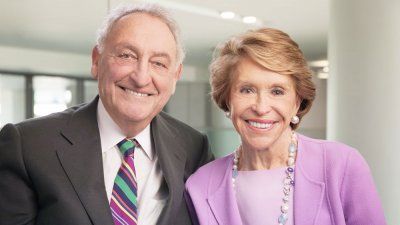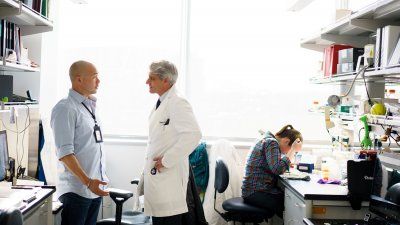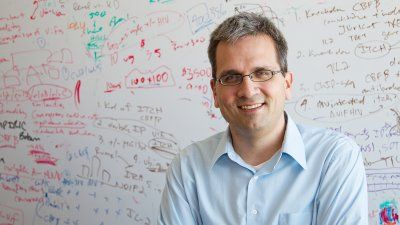University of California San Francisco
Give to UCSF-
-
Researchers Develop Safer Opioid Painkiller From Scratch
An international team of researchers has developed a new opioid drug candidate that blocks pain without triggering the dangerous side effects of current prescription painkillers.

-
When Children Are Diagnosed With a Sensory Disorder
-
The Key to Effectively Treating Mental Illness: Eliminate the Stigma
The stigma associated with mental illnesses is causing millions of Americans go untreated because of misconceptions and shame. UCSF researchers are among those who are pushing for changes that would help to eliminate the stigma and get people the treatments they need.

-
One Minute of Second-Hand Marijuana Smoke Impairs Cardiovascular Function
One minute of exposure to second-hand smoke from marijuana diminishes blood vessel function to the same extent as tobacco, but the harmful cardiovascular effects last three times longer, according to a new study in rats led by UCSF researchers.

-
Free To Be He, She, They
There is an increasing demand to address gender dysphoria early in childhood, prior to the onset of puberty. Under the guidance of Stephen Rosenthal, MD, UCSF’s Gender Center is helping parents and their children navigate this difficult terrain.

-
MEDIA ADVISORY: UCSF Experts on Homelessness and Health Resources Available to Speak with Bay Area Journalists Reporting on June 29
In preparation for the June 29 media focus on homelessness in San Francisco, UCSF would like to make reporters aware of the resources the university has available on the topic.

-
Parents-Only Therapy May Be Optimal in Treating Anorexia
Family therapy for 12- to 18-year-olds with anorexia nervosa, in which all household members participate and a meal is held in the clinician’s office, may be less effective than a streamlined model involving only the parents and without the meal.

-
$185M Gift Launches UCSF Weill Institute for Neurosciences
In the largest-ever gift to UCSF, the Weill Family Foundation and Joan and Sanford I. “Sandy” Weill have donated $185 million to establish the UCSF Weill Institute for Neurosciences.

-
Weill Gift Gives UCSF Unprecedented Opportunity to Advance Neurosciences Research
UCSF leaders are lauding the gift by Joan and Sanford I. Weill as transformational, giving the University an unprecedented opportunity to unite and expand its neurosciences community during a revolutionary period in brain discovery.

-
UC Regents Approve Preliminary Plans for New UCSF Neuroscience Building
UCSF is moving forward with plans to construct a new building at its Mission Bay campus to support its world-class neuroscience enterprise at a time of great opportunity for advancement in the field, following approval by the UC Regents.

-
PTSD in Veterans Tied to Worse Heart Health
A UCSF study found that veterans with post-traumatic stress disorder (PTSD) were more likely to have worse endothelial vascular function, which plays a key role in blood vessel dilation, blood pressure, clotting and inflammation.

-
Study Suggests ‘Emotional Health’ Implicated in Dementia
Serious and escalating depression in the elderly may almost double the likelihood of dementia, according to a study led by UC San Francisco, and could be an independent risk factor for cognitive decline, rather than just an early symptom of it.

-
Mindful Eating, Meditation May Lead to Better Metabolic Health
A diet and exercise program that included mindfulness training resulted in participants having lower metabolic risk factors compared to those who underwent the same program without the training, according to a study led by researchers at UC San Francisco.

-
UCSF Establishes Quantitative Biosciences Institute
UCSF announced the establishment of the Quantitative Biosciences Institute (QBI), to drive forward the application of computation, mathematics, and statistics toward a deeper understanding of complex problems in biology.

-
'Hey Siri, I’m Depressed': Can Smartphones Answer the Call for Help?
Personal voice assistants are increasingly used by smartphone owners for a range of health questions, but in a new study the telephone conversational agents responded inconsistently and incompletely to simple questions about mental health, rape and domestic violence.

-
Stephen Hinshaw Named 2016 James McKeen Cattell Fellow Award Honoree by APS
Co-Vice Chair for Psychology Stephen P. Hinshaw as been selected by the Association for Psychological Science as one of its 2016 James McKeen Cattell Fellow Award recipients.
-
Gene Linking Sleep and Seasonal Affective Disorder Found
A newly discovered human gene mutation appears to contribute both to unusual sleep patterns and to heightened rates of seasonal depression, according to new research from UCSF.

-
$25 Million From Oberndorf Foundation To Advance UCSF Psychiatry, Neuroscience Research
UCSF has received an unrestricted $25 million commitment from the Bill and Susan Oberndorf Foundation to advance basic research in psychiatry and the behavioral sciences.

-
Years of Marijuana Use Linked to Some Memory Problems Decades Later
A new study conducted at UCSF looked at “mid-level” marijuana users and found that this group had worse verbal memory but no deficiencies in other measures of cognitive function.

-
Scientists Move Closer To Understanding Schizophrenia’s Cause
-
Brain Structure Governing Emotion Is Passed Down From Mother To Daughter, Says UCSF Study
A study of 35 families led by a UCSF psychiatric researcher showed for the first time that the structure of the brain circuitry known as the corticolimbic system is more likely to be passed down from mothers to daughters than from mothers to sons or from fathers to children of either gender.

-
The Mysterious Link Between Autism and Extraordinary Abilities
-
Big Ideas in Health and Science for 2016
We asked experts across UCSF to identify what's ahead in how we approach research, what disease areas will see major advances, and where basic science will be translating into real treatments.

-
Illuminating Depression’s Circuitry
If depression is caused by flawed brain circuitry, it may be possible to shift that circuitry toward healthy neural processing instead. UCSF researchers hope to map and correct aberrant neural behavior to cure mood disorders.

-
Pioneering UCSF Clinic Helps Transgender Youth Be Themselves
The UCSF Child and Adolescent Gender Center is a one-stop, interdisciplinary clinic offering the wide range of services necessary for mental and physical evaluation and care – and if deemed appropriate, a healthy transition – for children diagnosed with gender dysphoria.

-
One Neuroscientist’s Quest to Create Healthier Brains
The trajectory of Bruce Miller’s work is emblematic of the integration seen within the entire neurosciences field over the last decade, as its broad range of disciplines attract unprecedented levels of investment.

-
Patients With Severe Mental Illness Rarely Tested for Diabetes, Despite High Risk, Study Shows
Although adults with serious psychiatric disorders are at high risk for diabetes, a large study led by UCSF reveals that low-income patients on Medicaid are rarely screened for it.

-
Society for Neuroscience Awards UCSF Neurobiologist Posthumous Honor
The late UCSF neuroscientist Allison Doupe, MD, PhD, will be honored by the Society for Neuroscience with the Patricia Goldman-Rakic Hall of Honor award at the society’s annual meeting in Chicago later this month.

-
UCSF Among World’s Best in US News Global Universities Rankings for 2016
UCSF ranks among the top five schools in the world in seven subject areas, according to the 2015 U.S. News & World Report's 2016 Best Global Universities rankings.

